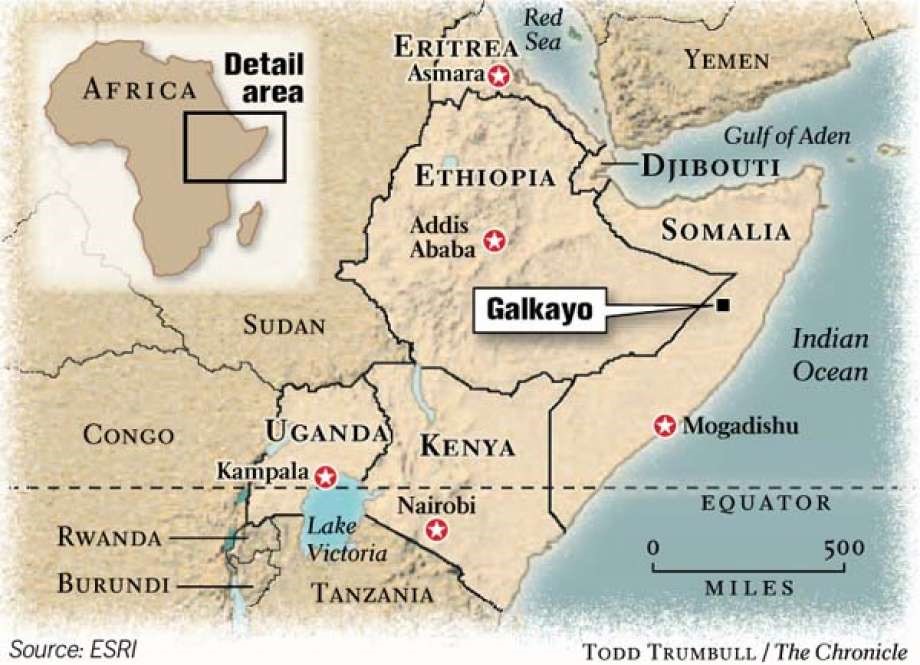Andrew McGregor
August 20, 2009
Five Pakistani shaykhs were murdered and two wounded in a vicious attack on a mosque in central Somalia (Shabelle Media Network, August 12). The Islamic preachers were members of the Tablighi Jamaat, a normally non-political Islamic missionary order that originated in India and Pakistan before spreading to East Africa. The victims were among 25 Tablighi shaykhs who arrived in Somalia on August 11. Most came from the Pakistani city of Karachi.

The attack occurred in Galkayo, a city in the Mudug region of central Somalia. Galkayo lies on the southern edge of the semi-autonomous province of Puntland. The administration of Galkayo is disputed – the northern half is administered by the government of Puntland, while the southern half is controlled by the Sufi militia, Ahlu Sunnah wa’l-Jama’a (Xoghaye Media Center, July 8). South Galkayo is the capital of the semi-autonomous state of Galmudug, formed in 2006.
According to witnesses, the Tablighi shaykhs were dragged by masked men from the Towfiq mosque and shot in the street shortly after dawn prayers. The Towfiq mosque, located along the dividing line between north and south Galkayo, is known as a gathering point for Tablighi Jamaat members, including those arriving from Pakistan (Shabelle Media Network, August 12).
Puntland president Abdirahman Muhammad Farole blamed “the administration of South Galkayo” for ordering the killings, but Galmudug officials blamed Puntland (Reuters, August 13). There is speculation that the shaykhs may have been suspected by their killers of being al-Qaeda operatives. Somalia’s new security minister, Muhammad Abdullahi, was not entirely convinced the deceased were Tablighi missionaries. “Foreign fighters have been using this as cover and acting like preachers in Somalia. Nobody is sure if they were real preachers, but we condemn the killing of people in a mosque” (Reuters, August 14). Abdullahi warned Islamic preachers and other foreigners not to come to Somalia without government approval and guidance. Rumors circulating in Galkayo blame Ahlu Sunnah wa’l-Jama’a for the murders, though the movement has denied responsibility and says it is mounting its own investigation (Garowe Online, August 12). The growth of the socially conservative Tablighi Jamaat in Somalia has come largely at the expense of the local Sufi orders. A spokesman for Ahlu Sunnah wa’l-Jama’a, Shaykh Muhammad Abdi Sa’id, said the murders were “contrary to the teaching of Islam” (al-Jazeera, August 13).
A spokesman for the al-Qaeda associated al-Shabaab movement, Shaykh Ali Mahmud Raage (a.k.a. Shaykh Ali Dheere), described the killings as “the worst thing in Somalia’s history,” adding that the “killing of religious men is unknown among the Somali community” (al-Jazeera, August 13). He blamed the attack on “anti-Islamic elements” and pledged the movement would seek “revenge” for the killings, though he declined to say what group al-Shabaab suspected of responsibility (Garowe Online, August 14; Soomaalidamaanta, August 12).
In Islamabad, Somalia’s ambassador was summoned to the Foreign Office to account for the murders (Daily Times [Lahore], August 14). Somalia’s foreign minister called Pakistan’s Minister of State for Foreign Affairs to express the government’s condolences and discuss the repatriation of the surviving members of the Tablighi group (The News [Islamabad], August 14). At least one Pakistani daily viewed the event with alarm: “Islamabad should not be surprised if Somalia becomes the victim of a full-fledged Pakistani assault and thereafter becomes a base for terrorist operations against Pakistan” (Daily Times [Lahore], August 14).
The Galkayo massacre was not the first to target the Tablighi Jamaat in Somalia. On April 19, 2008, Ethiopian troops burst into Mogadishu’s al-Hidaya mosque, where they slaughtered 11 Jamaat members as well as another ten civilians outside the mosque. Seven of those killed inside the mosque had their throats slit. The attack came only days after Ethiopian troops arrested 41 Quranic students attending the mosque. Nearly all were released after the Somali government failed to find any evidence of wrongdoing (Garowe Online, April 24, 2008; Somaliland Times, April 25, 2008; see also Terrorism Focus, April 30, 2008).
This article first appeared in the August 20, 2009 issue of the Jamestown Foundation’s Terrorism Monitor
